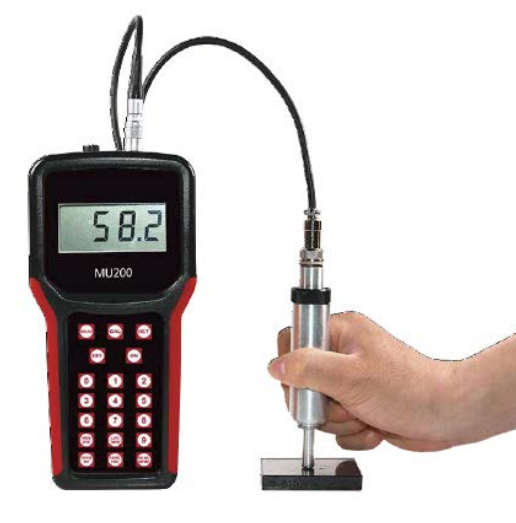Large-scale industries require various tests on their components to regulate the condition and stability of the whole system. Furthermore, these tests require large parameters, tools and a league of experts who can interpret all those data accumulated from these procedures. One such test that is necessary is the hardness test.
The traditional hardness test for a certain material may be a drawback for large-scale production plants because it demands high amount of force in the operation. It may cost the owners an inefficient price to pay just to satisfy the test runs. And this is where innovation takes place.
The ultrasonic hardness tester, a device that uses the ultrasonic contact impedance method which relies on the nature of high frequency sound waves to detect the material hardness without causing any major damage or indentation. It’s a nondestructive tester which minimizes the downtime of complex systems. And it also provides information about the material including its flaws and other relevant defects for further risk-based inspection.
The idea of this tester is the principle of sound traveling through the material until it hits a flaw then the waves goes back to the transducer which is where the sound is being produced. Then these sound waves are converted into electrical pulses for the operator to analyze and interpret. This technological advancement is optimal for large-scale industries because of its indispensible nondestructive characteristic.
For oil & gas industry and large pipe manufacturers, various regulations and standards are needed to be conducted periodically. This is for the purpose of extending the sustainability of the plant production and for the safety of its components. Therefore, certain measures in choosing the right test procedures and equipment are to be considered. And alongside these measures are the benefits which will help in determining the best criterion. The ultra hardness tester has its own beneficial factors for these large-scale groups. Such benefits include:
- Fast data display for quick integration
- Portable and lightweight
- Detects and locates flaws and corrosion without greatly damaging the material
- Works on surfaces of thick material
- Does not need great amount of force for indentation
- Does not require the whole plant operation to stop during test runs
For large-scale quantities, the periodical tests should not last for more than a day. It is necessary and convenient that the tests are run quickly and smoothly to avoid unwanted circumstances in the production. Such type of hardness tester provides fast display of data for operators to immediately supply solutions and fix faulty lines in the production.
The portability of the tester is ideal in fieldwork for certain reasons. It is essential for the operator to go around the plant easily and run the hardness test. It provides less amount of load for carrying.
On the other hand, the determination of flaws and corrosion is a critical aspect to consider. The major part of the plant production depends on this aspect. A minor flaw might cause gradual decrease in the production rate and it might affect the whole operation in the long run. That is why there is a need for regular inspection of the system components.
The tester’s capability of using sound waves to travel through thick materials is a vital part of the innovation. The science behind this is the device that emits the sound called the transducers. Basically, sound waves travel through until such length that it hits a flaw then it goes back to the transducer then operators can determine the size and exact location of the flaw.
Although the ultrasonic tester requires great amount of knowledge of experts to interpret the data, it does not need that great amount of force to cause indentation on the material. It only uses sound vibrations and the concept of piezoelectric materials to determine flaws, corrosions and other relevant defects.
Industrial processes should constantly work in all conditions. There is not a need to stop the process just to run such tests. This tester allows the operator to keep the balance in the production flow. Thus, achieving the desired outcomes is not interfered. This is ideally for oil and gas industry which keep the flow of the operation in constant motion.
It is also important to consider keeping the efficiency of the plant production especially for the extensive manufacturers. The operator always assures that the production will not be greatly affected by these series of tests. Thus, his decisions should also be cost-effective to maintain the stability of the production flow.
The ultrasonic hardness tester is an innovative compact device built to efficiently characterize the strength of a material and determine anomalies in the yielding process. It is essential to avoid decrease in the production growth as well as avoid accidents within the premises to promote and stabilize maximum safety of the plant.
It serves a purpose to the large-scale manufacturers in terms of maintaining the flow of the production. It is still a responsibility to maximize the efficiency of the operation while minimizing the factors of downtime during the inspection and implementation of different tests. Furthermore, every aspect of the plant production should be critically considered and not to be overlooked.
Contact us today to learn more about the portable hardness tester that works best for you.
